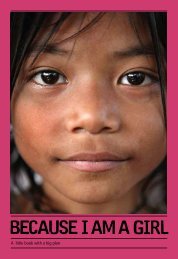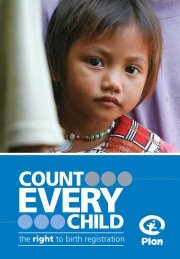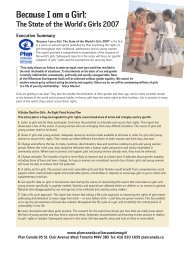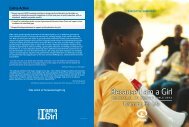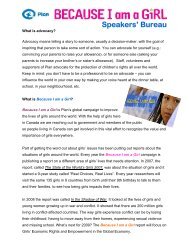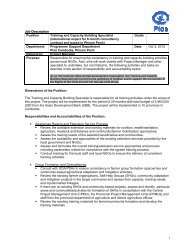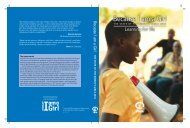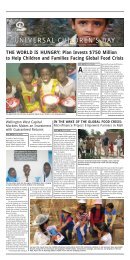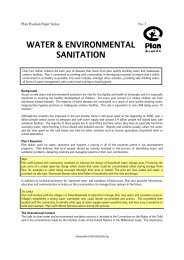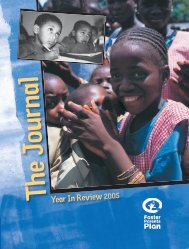Plan Worldwide Annual Review and Combined Financial ...
Plan Worldwide Annual Review and Combined Financial ...
Plan Worldwide Annual Review and Combined Financial ...
You also want an ePaper? Increase the reach of your titles
YUMPU automatically turns print PDFs into web optimized ePapers that Google loves.
<strong>Plan</strong>’s global spend in 2012<br />
€97 million<br />
Vietnam<br />
Young children <strong>and</strong> parents play <strong>and</strong><br />
learn together<br />
High in the mountains of Quang Tri, in northern<br />
Vietnam, a group of children under five are learning<br />
through play – <strong>and</strong> so are their parents. Through games,<br />
singing Vietnamese songs, dancing <strong>and</strong> reciting poems,<br />
the children develop new skills, while their parents<br />
learn the best ways to play with their children.<br />
In a country with few preschool programmes,<br />
<strong>and</strong> a tradition of learning by rote, <strong>Plan</strong> has<br />
developed a child-centred, bilingual approach to<br />
preschool provision specially tailored to members<br />
of minority ethnic groups whose mother tongue is<br />
not Vietnamese.<br />
Each playgroup hosts more than 100 parents <strong>and</strong><br />
130 children, who come together twice a month.<br />
Twenty-one <strong>Plan</strong>-trained early childhood care <strong>and</strong><br />
development teachers <strong>and</strong> community volunteers<br />
facilitate activities tailored to different age groups,<br />
using toys, posters <strong>and</strong> hygiene accessories provided<br />
by <strong>Plan</strong>. Key information <strong>and</strong> childcare practices are<br />
reinforced through home visits by ECCD promoters.<br />
So far, 17,000 children from birth to the age of six,<br />
from seven communities in the area, have benefited<br />
from the scheme. “Now, I spend more time playing<br />
with my six-month-old boy,” says one mother. “The<br />
ECCD promoters also advise me on how to keep<br />
children clean <strong>and</strong> safe.”<br />
Ug<strong>and</strong>a<br />
Early childhood centres give children<br />
a head start<br />
Few Ug<strong>and</strong>an children have access to early childhood<br />
care – especially in marginalised communities. As a<br />
result, many of these children struggle in school, which<br />
means they risk dropping out or leaving school with not<br />
enough learning to continue in education or get work.<br />
In 2009, <strong>Plan</strong> began supporting communitymanaged<br />
early childhood centres in 16 marginalised<br />
communities, using an approach called Community-Led<br />
Action For Children. Community members provide the<br />
space, labour <strong>and</strong> local materials, <strong>and</strong> contribute to<br />
the curriculum, as well as recruiting teachers <strong>and</strong><br />
forming management committees. <strong>Plan</strong> provides<br />
on-site supervision <strong>and</strong> support in lesson planning<br />
<strong>and</strong> delivery, plus a small stipend to 88 teachers<br />
(68 of whom are female). The scheme also runs<br />
parenting sessions on issues ranging from literacy<br />
to effective, non-violent discipline.<br />
So far, 647 children (including 319 girls) have enrolled<br />
directly from the centres into grade 1. Thanks to the<br />
high dem<strong>and</strong>, in just three years the number of<br />
centres has grown from the initial 16 to 65.<br />
“When my children moved on to primary<br />
school,” says one mother, “they could write<br />
properly. When the teacher asked them their<br />
names, they didn’t shy away like beginners.<br />
I’m proud that my children acquired social skills<br />
that enable them to express themselves.”<br />
Guatemala<br />
Mothers learn to protect against<br />
malnutrition<br />
Doña Olga, 31, left school in the fifth grade.<br />
Today she runs a community childcare centre in<br />
her hillside home in Alta Verapaz for 22 mothers <strong>and</strong><br />
their children aged up to 6, every Saturday morning.<br />
Doña Olga was prepared for the role by <strong>Plan</strong>’s<br />
Networks for Children project, run with the<br />
Organization of Ibero-American States to help<br />
communities detect <strong>and</strong> prevent malnutrition.<br />
Despite progress in the last decade, Guatemala still<br />
has the highest rates of infant mortality in Central<br />
America, with 32 deaths in under-fives for every<br />
1,000 live births, often due to chronic malnutrition.<br />
These self-managed community centres are being<br />
run in 80 communities in Guatemala that have little or<br />
no formal early childhood care provision. They are for<br />
mothers of children under six <strong>and</strong> led by local Caregiver<br />
Mothers, like Doña Olga, who are trained in nutrition,<br />
health <strong>and</strong> maternity care.<br />
This year, <strong>Plan</strong> advised 30,993 pregnant <strong>and</strong> lactating<br />
women on child care <strong>and</strong> breastfeeding, <strong>and</strong> 10,093<br />
households participated in food education <strong>and</strong><br />
demonstration activities promoted by <strong>Plan</strong>.<br />
We also trained 804 people working in hospitals<br />
<strong>and</strong> communities in caring for children’s nutrition.<br />
“I’m spreading what I’m learning,” says Doña Olga.<br />
“I learn it, I pass it on.”<br />
EARLY CHILDHOOD CARE AND DEVELOPMENT<br />
19



